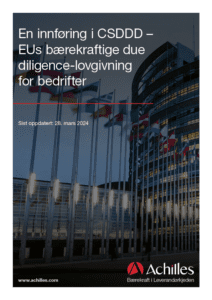Sist oppdatert: mars 2024
Den europeiske unionens direktiv om selskapers bærekraftige forpliktelseserklæring er en betydelig utvikling i Den europeiske unionens tilnærming til regulering av forsyningskjeder. Når det trer i kraft, vil dette direktivet kreve at selskaper implementerer effektive prosesser for due diligence i forsyningskjeden for å forhindre og redusere negative menneskerettighets-, miljø- og klimaimpakter. Gjennomføringen av direktivet vil skje gradvis av EU etter ratifiseringen, der hvert medlemsland håndhever direktivet med sine relevante regulatorer.
Direktivet om selskapers bærekraftige forpliktelseserklæring har gjennomgått flere behandlinger i Europaparlamentet og er nå godkjent av Europaparlamentet. Selv om vi vet hvilke organisasjoner det vil påvirke og omfanget av det, er det fortsatt en grad av uklarhet rundt hvordan det vil bli implementert på nasjonalt nivå i hele EU, og hva det vil bety for de berørte organisasjonene (og deres leverandører) som må overholde det.

Hva det dekker Denne hvitboken er ment å gi en nyttig oppsummering av det vi så langt vet. Vi vil oppdatere den etter hvert som mer informasjon kommer frem. Den inkluderer:
- En oversikt over direktivet om bedriftens bærekraftige due diligence og hva det omfatter Forholdet mellom CSDDD og annen lovgivning som den tyske Lieferkettengesetz og den Åpenhetsloven.
- Hvorfor CSDDD er viktig.
- Hvilke organisasjoner som må etterleve det.
- Forpliktelsene for selskaper og direktører.
- Rapporteringskravene for CSDDD.
- Sanksjoner for manglende overholdelse.
- Fordeler og utfordringer med overholdelse.
- Praktisk veiledning om hvordan du kommer i gang.
Fyll ut skjemaet for å laste ned denne gratis hvitboken nå.



